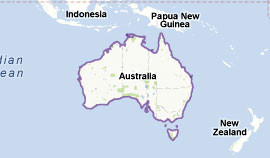
Justice Peter McClellan launched public hearings in the Royal Commission into Institutional Responses to Child Sexual Abuse, announced by the government last November, saying that thousands of people had so far come forward.
“It is now well known that the sexual abuse of children has been widespread in the Australian community, however the full range of institutions in which it has occurred is not generally understood,” McClellan said in his opening address.
“Many of the stories we are hearing will shock many people.”
The inquiry was established by former prime minister Julia Gillard in response to a series of child sex abuse scandals involving pedophile priests, though she insisted the probe would be much broader than the Catholic Church.
A hotline set up for survivors of abuse to contact the commission had so far received 4,301 relevant calls, McClellan said.
Of these, 398 people had given a private briefing to the commission, 449 were awaiting their session and another 1,178 were yet to be assessed.
“Many people who have come to the commission have suffered greatly, both at the time that the abuse occurred and subsequently through their lives,” he told the commission hearing in Sydney.
“Many have received counselling at various stages of their lives, many have thought of suicide and some have attempted it.
“Many people including those who suffered abuse 30 or 40 years ago break down in the course of telling their story and require the assistance of support persons to be able to continue.”
McClellan said the commission faced a mammoth task and would have to be selective in the matters it took to a public hearing, limiting them to “systemic issues and policy matters” or where a “significant cluster of abused individuals” was uncovered.
McClellan said some “preliminary themes have already emerged”.
In residential institutions such as orphanages and boarding schools, for example, he said the commission had established that “sexual abuse is almost always accompanied by almost unbelievable levels of physical violence inflicted on the children by the adults who have responsibility for their welfare”.
The events would often set off a domino effect, with a victim’s schoolwork suffering, limiting their future employment prospects, and their ability to trust others and form relationships damaged beyond repair.
“The damage to an individual, be it a boy or girl, who was abused at a time when, because of their age, they are unable to resist an abuser or report the abuse to others, may be life-changing,” he said.